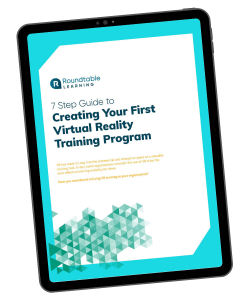During your high school career, it is almost certain that you have had a teacher tell you that college professors or bosses “will not hold your hand” throughout lessons or jobs. Now, this probably comes from a place of frustration with the majority of a history class collectively forgetting a homework assignment or some other schoolwork blunder, but it certainly holds a lot of truth. Of course our professors and bosses are there to guide us, but they won’t walk us through every minute detail of our lessons or jobs–and they shouldn’t. This quote speaks to exactly what adult professionals and learners need: independence. Andragogy asserts that adult learning needs to allow independent learning for it to be effective. Let’s discuss some applications and delivery methods that allow you to offer independent yet effective training and eLearning experiences.
Applying the Adult Learning Theory to Training
When creating your training courses, it is important to keep the Adult Learning Theory at the focus of your design. Andragogy is fundamentally based on self-directed and independent learning. Applications of the theory in conjunction with designing training courses will rely heavily on autonomy, collaboration, enablement, self-direction and example. Let’s break this down.
- Training should function like a workshop, where learners are given information and encouraged to examine and discuss information with one another. Training leaders serve should serve as facilitators and should operate on the one-third principle: one-third of the course is lecture, the rest is active.
- Before designing training courses, collaborate with your employees. Ask them what they would like to learn and include them in discussions of how they would like to learn. Also, be sure to include employees in the evaluation process; ask for their feedback on the course.
- Enable your employees with the independence and freedom to choose when and where they would like to complete mandatory training. eLearning modules make this incredibly easy; modules can equip employees with the necessary knowledge while allowing learning to take place at the employee’s own comfortable pace.
- Since adults prefer self-directed learning, create training that allows them to independently problem-solve and set personal learning objectives. This kind of content will both engage and challenge adult learners.
- Use examples! Adult learners like to know that what they are learning will have an immediate benefit or use. Relate the training with real-world examples or examples they are already familiar with. By doing this, your training course will illustrate the “what’s in it for me” uses for the learner.
Delivery Methods
Utilizing delivery methods that reflect the Adult Learning Theory is equally as important as applying it to the design of training and eLearning courses. To avoid holding the learner’s hand throughout training, try to employ some of these delivery methods:
Active Practice
Active practice functions by allowing trainees to try out what they are learning. For example, if employees are being trained on a new piece of machinery, it is important to let them try to operate the machinery. To maintain a safe environment and avoid injury, implementing Virtual Reality training that allows the learner to independently and actively operate the simulated machinery is an excellent way to achieve active practice.
Varied Presentation Methods
Have you ever sat through a training Powerpoint presentation that is so boring it nearly puts you to sleep? Well, your employees don’t want to suffer through that either! Utilizing methods such as teachbacks or simulations can appeal to your employees’ unique learning styles.
Teachbacks
An excellent way to demonstrate that you understand the knowledge gleaned during training is to teach what you’ve learned to someone else. Teachbacks allow the learner to reflect on their adult learner experience during training and then teach from that experience.
Simulations
Simulation training provides a virtual environment for learners to gain real-life experience in a risk-free environment. As adults are inclined to undergo training that will equip them with skills that directly apply to their work. Simulations can offer scenarios that require immediate applications for these skills.
Competition
A little healthy competition can help boost your training courses. Try turning knowledge checks into game-show quizzes or dividing employees into teams to complete timed training actions. Sometimes winning is enough but rewards can also serve as incentives for learner involvement. This reflects the motivation to learn assumption of the theory.
Summary
Understanding the Adult Learning Theory is just as vital to the success of your training course as applying the theory. Now that we have covered what the theory is and some practical applications and delivery methods, you can effectively design and deliver successful training courses. Not sure how to start? Get in touch with one of our Learning Specialists so we can help you create award-winning learning content for your team.








